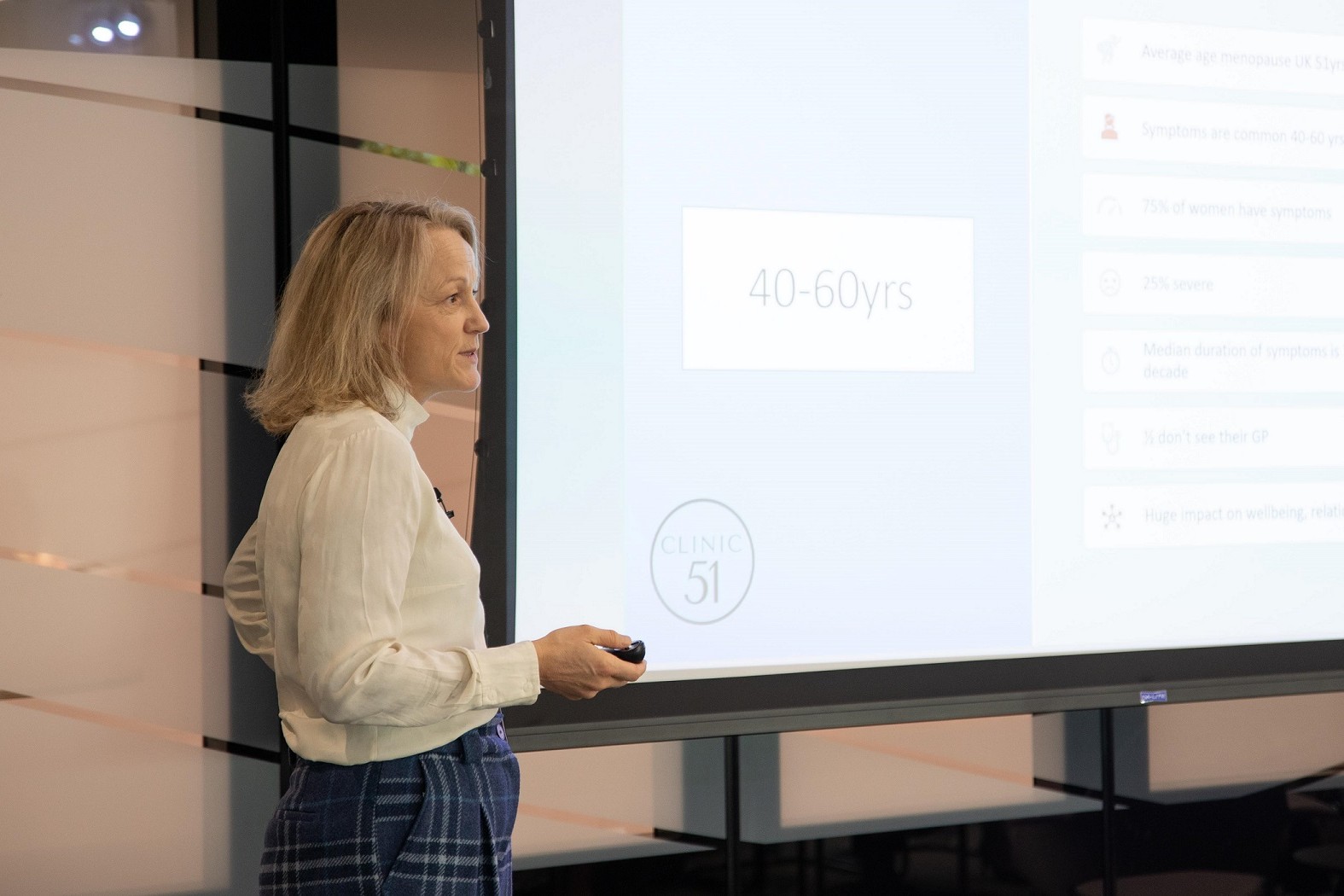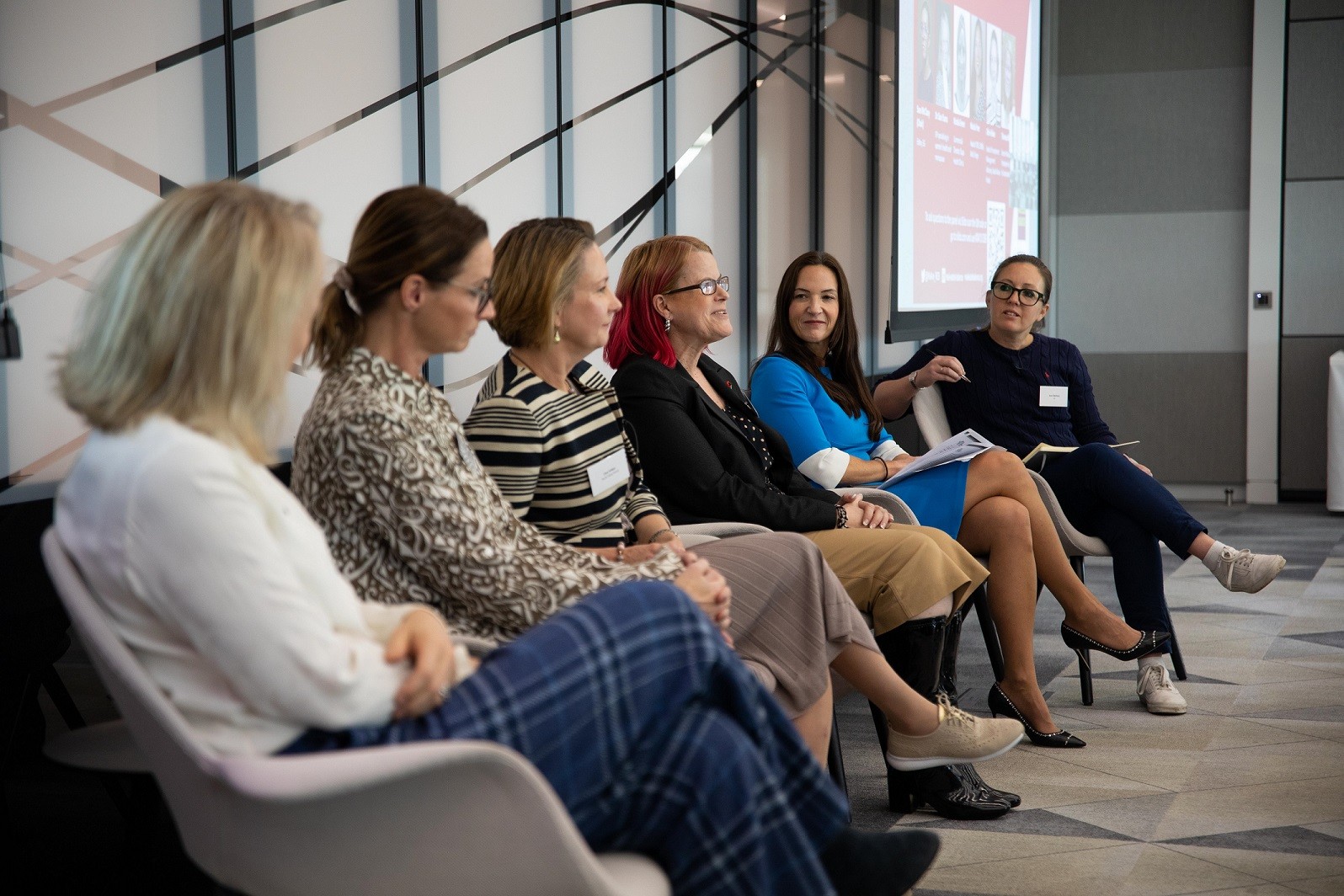By joining Real Estate Balance’s email list, you agree to receive email updates from time to time about organisation news, events being held and information about our partners in accordance with the terms outlined in our privacy notice, which you can read in full here.
Sign upMenopause in the workplace

At the same time as women over 50 being the fastest-growing demographic in UK workplaces, many are leaving their roles, reducing their hours and passing up promotion opportunities because of menopause symptoms.
Indeed, it is thought one million women have left UK workplaces because of it.
Working with the Network of Networks of EDI organisations in our sector organised by Real Estate Balance, our members and menopause specialists were invited to an event at Wells Fargo in London to further explore how menopause and peri-menopause affects women and how organisations can develop menopause-inclusive workplace cultures.
Dr Sian Evans, a GP specialising in women's health and menopause, and Nicola Green, Commercial Director, Bupa Health Clinics, started the conversation by talking about managing symptoms and accessing occupational health guidance and information.
The statistics they shared were enlightening.
The average age for a woman to start the menopause process is 51-years-old and it typically lasts for four years but has gone on for as long as 12 years in some cases.
There are at least 34 possible symptoms that can occur due to hormone deficiency during the menopause and beyond.
Almost 60% of women on the menopause process have struggled to access menopause services on the NHS, and a quarter of women who visited a GP said there was a possibility their symptoms being menopause-related had been missed.
After discussing the medical aspects of the menopause, Sian and Nicola then joined a panel discussion with the property professionals listed below to discuss menopause in the workplace, and how we are all missing out on talent and experience when employers are not doing all they can to understand menopause and provide inclusive cultures.
- Sam McClary (Chair) - Editor, EG
- Cléo Folkes - Head of Investment Management Advisory, Social Value Portal
- Nicola Free - Head of CRE, EMEA, Wells Fargo
- Theresa Winters - Senior Manager, Employee Experience for Santander UK
Although there are 3.5 million women aged over 50 in Britain’s workplaces, half of them said they struggled at work while going through the menopause process.
A quarter of affected women said they had considered leaving their roles because of symptoms and one in five women on the menopause process had taken time off work because of it.
As well as describing their own experiences of menopause, the panellists talked about small practical steps employers can take to improve the comfort of women at work.
These reasonable adjustments included temperature control and providing fans, showers and changes of uniform and introducing flexible and hybrid working options for women on the menopause process.
The below resources have been selected to provide our members with the leading advice when it comes to menopause in the workplace.
CIPD Menopause at work: Guide for people managers
CIPD Menopause at work: a guide for people professionals
Henpicked: Menopause in the workplace and the Menopause Friendly Employer Accreditation
Women’s Health Concern – Menopause in the Workplace
BS 30416, Menstruation, menstrual health and menopause in the workplace - guide

The below list of links are to helpful web-based support for perimenopause and menopause, proving useful resources, expert information and advice, videos and podcasts, shared stories, online forums and support networks.
The free balance app by renowned menopause specialist, Dr Louise Newson and the thousands of people who’ve shared their perimenopause and menopause insights with her, allows you to track your symptoms, access personalised expert content, download a Health Report, share stories in the community and lots more.
Black women in menopause is a platform that raises awareness of black people’s menopausal experiences providing a safe space for black people and people of colour, to ensure that they have access to accurate information about how the menopause affects them and content relevant to their needs.
The British Menopause Society (BMS) is the specialist authority for menopause and post reproductive health in the UK. Find your nearest BMS menopause specialist is a link for help and advice for women who have a specific medical question and do not feel their GP has answered all their questions. It enables them to find a menopause specialist, some of the specialists are private as well as NHS.
BMS TV is a series of short videos covering some of the key topics in menopause care by leading specialists in their field.
GenderGP: 5 Menopause and Hormone Facts. GenderGP is an online health and wellbeing clinic which serves transgender people of all ages across the world – and those who support them.
Henpicked Menopause Hub has a wealth of resources, expert information and advice, videos and podcasts and top tips and women’s stories to help people make informed choices.
The Menopause Charity’s aim is to educate everybody so that perimenopause and menopause are properly understood.
Menopause Matters is an award winning, independent website providing up-to-date, accurate information about the menopause, menopausal symptoms and treatment options. Here you will find information on what happens leading up to, during and after the menopause, what the consequences can be, what you can do to help and what treatments are available. They have a forum that women find useful.
Menopause Support is a not-for-profit community interest company and the home of the national #MakeMenopauseMatter campaign which calls for mandatory menopause education for doctors, greater menopause awareness and support in the workplace and for menopause to be added to the RSE curriculum in secondary school education. As well as free resources on the website, there is a closed Facebook Group, The Menopause Support Network
Menopause whilst black is a series of podcasts placing the menopausal experience of Black UK based women front and centre by sharing their stories.
The NHS has guides to Menopause and The ‘male menopause’
Rock My Menopause is a campaign of the Primary Care Women’s Health Forum, a group of 10,000 healthcare professionals with a special interest in women’s health. The Forum aims to help women to recognise that their symptoms may be menopause and have the confidence to speak to their doctor if they are affecting their quality of life. Rock My Menopause: Transgender Health
Women’s Health Concern is the patient arm of the BMS. Women’s Health Concern Email Advisory Service provides advice about a specific enquiry. There is a minimum donation request for this service. Women's Health Concern factsheets and other helpful resources
You and your hormones is an education resource from the Society for Endocrinology.